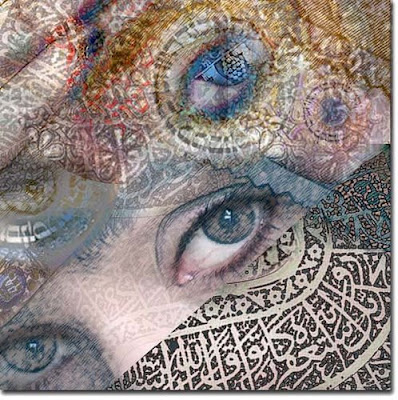 All the recent jazz about appeasement, dialogue and reaching out to enemies in a sense of friendly give and take, subtle nuances and zero preconditions has yet to really consider potential summit mates.
All the recent jazz about appeasement, dialogue and reaching out to enemies in a sense of friendly give and take, subtle nuances and zero preconditions has yet to really consider potential summit mates.Perhaps the best source for the view through an adversary's eyes is the Iranian co founding sponsor of Hiz'B'Allah and until recently Iran's ambassador to Syria.
Interviewed by Asharq Al-Awsat in Lebanon, Mullah Mohammad Hassan Akhtari reflected on his godfather status of HBA, the recent tensions in Lebanon yet nary a word on his fallout with ex BFF Bashar
Akhtari took the new idea of a "Hiz'B'Allah" and transformed it over the years of his service as ambassador into a reality that has considerably changed the balance of power in the region. Akhtari, twice ambassador to Syria, (1986 - 1997) and (2005 - January 2008), was the most influential diplomat in Syria.
He was no ordinary ambassador.
"I was a Friday prayer imam, and from there I came to a seat of political
responsibility and diplomatic relations. My background was a good pointer for
achievement. In addition, I arrived in Damascus on 5 Ramadan 1986, and started
work next day."
In addition to being the "operational father" of Hiz'B'Allah, he was engineer of "the special relations" between Syria and Iran, coordinator of Iran's relations with Palestinian organizations in Damascus, and founder of the Palestinian-Iranian Friendship Society, which includes representatives from all Palestinian organizations in Damascus.
In my capacity as representative of the Islamic Republic, I played a role
in supporting, widening and deepening the resistance. But as far as we and
Hiz'B'Allah are concerned, we are all of one religion and one faith. We and
Hiz'B'Allah regard the United States as an enemy of Islam and Muslims.We regard Israel as a cancer in the body of the region and that the policy
of confrontation and resistance is fundamental As for the modes of
implementation, Hiz'B'Allah may have its ways and means and different forms of
expression. This may happen. As far as fundamentals, roots, and objectives
are concerned, there are no differences between us."
Great Satan's avuncular 'Stache' Grande points out nonprofit jawflapping is totally retarded
"At first glance, the idea of sitting down with adversaries seems hard to
quarrel with. In our daily lives, we meet with competitors, opponents and
unpleasant people all the time.
The real debate is radically different. On one side are those who believe
that negotiations should be used to resolve international disputes 99% of the
time.
On the other side are those who apparently want to use negotiations 100%
of the time. It is the 100%-ers who suffer from an obsession that is naïve and
dangerous.
Negotiation is not a policy. It is a technique. Saying that one favors
negotiation with, say, Iran, has no more intellectual content than saying one
favors using a spoon. For what? Under what circumstances? With what objectives?
Like all human activity, negotiation has costs and benefits. If only benefits
were involved, then it would be hard to quarrel with the "what can we lose?"
mantra one hears so often. In fact, the costs and potential downsides are real,
and not to be ignored.
When the U.S. negotiates with "terrorists and radicals," it gives them
legitimacy, a precious and tangible political asset. Thus, even Mr. Obama
criticized former President Jimmy Carter for his recent meetings with Hamas
leaders. Meeting with leaders of state sponsors of terrorism such as Mahmoud
Ahmadinejad or Kim Jong Il is also a mistake.
State sponsors use others as surrogates, but they are just as much terrorists
as those who actually carry out the dastardly acts. Legitimacy and international
acceptability are qualities terrorists crave, and should therefore not be
conferred casually, if at all.
In today's world of weapons of mass destruction, time is again a precious
asset, one almost invariably on the side of the would-be proliferators. Time
allows them to perfect the complex science and technology necessary to sustain
nuclear weapons and missile programs, and provides far greater opportunity for
concealing their activities from our ability to detect and, if necessary,
destroy them.
Iran has conclusively proven how to use negotiations to this end. After five
years of negotiations with the Europeans, with the Bush administration's
approbation throughout, the only result is that Iran is five years closer to
having nuclear weapons. North Korea has also used the Six-Party Talks to gain
time, testing its first nuclear weapon in 2006, all the while cloning its
Yongbyon reactor in the Syrian desert.
Finally, negotiations entail opportunity costs, consuming scarce presidential
time and attention. Those resources cannot be applied everywhere, and engaging
in true discussions, as opposed to political charades, does divert time and
attention from other priorities.
No better example can be found than the Bush administration's pursuit of the
Annapolis Process between Arabs and Israelis, which has gone and will go
nowhere. While Annapolis has been burning up U.S. time and effort, Lebanon has
been burning, as Hezbollah strengthens its position there. This is an
opportunity cost for the U.S., and a tragedy for the people of Lebanon."
2 comments:
One has to pause and take all this in. It can't be denied but the solution is the difficulty. No fan of appeasement myself, yet dialogue from a strong standpoint is another thing, with a strong hand of cards.
No matter how strong a hand you talk with, unless you use or show the ability to use said hand, it will still be appeasement.
We have the strongest hand in the world and Iran simply sees it as another form of diplomacy. Without action, words lose weight, especially when talking to someone who's mind is either made up completely or not completely there.
Post a Comment